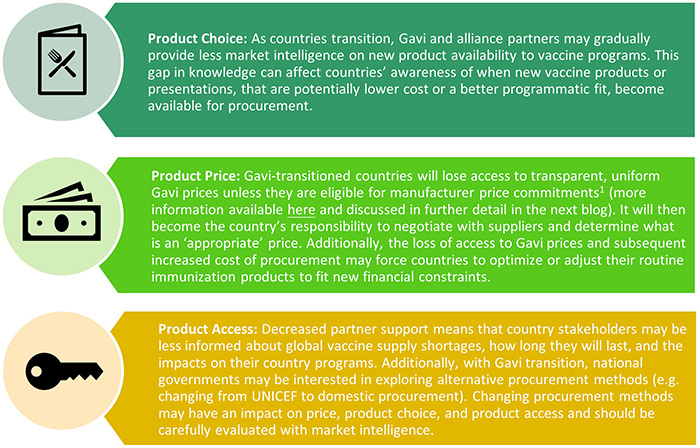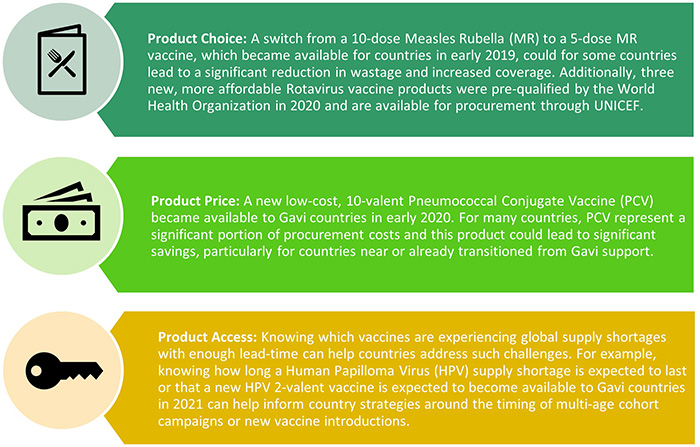Estimated readtime: 4.5 min
Authors: Jason Zhu (CHAI), Priscilla Rouyer (CHAI), Johanna Fihman (WHO), and Miloud Kaddar (LNCT)
Gavi-transitioning countries face many challenges in ensuring hard-fought immunization gains are maintained as external financial and technical support is reduced. Vaccine procurement is one area that may be affected by transition – but preparatory strategies do exist. The importance of market intelligence to procurement and Gavi transition may not be obvious because such support is embedded in Gavi and partner technical support and is less visible than co-financing challenges. For example, Gavi countries can access transparent, uniform Gavi prices; partners are active in providing updates on availability of new vaccine products and supply shortages; and partners help support product selection decision making. However, in this series of blogs, we will discuss in detail how Gavi transition can create significant risks if countries are not well set up to best make use of publicly available market intelligence to inform a variety of procurement and immunization program decisions.
The objective of this blog series is to demonstrate how market intelligence can be used to ensure that Gavi-transitioning and -transitioned countries have continued access to affordable and high-quality vaccines. Market intelligence can be used to reduce procurement costs, improve programmatic fit of a country’s vaccine portfolio, and better plan for future supply and procurement budget forecasts.
This blog is designed as a three-part series, the first of which will be covered here:
- Gavi transition’s impact on vaccine procurement and the critical role of market intelligence
- Market intelligence on vaccine product choice and price
- Market intelligence resources for product access and implementation strategies
Gavi transition’s impacts on vaccine procurement
The extent to which a country’s vaccine procurement will be affected by Gavi transition will vary depending on the procurement method (e.g. self-procurement, UNICEF SD, regional procurement), level of Health Systems Strengthening and Technical Country Assistance support, and support from other non-Gavi partners following Gavi-transition, countries may lose access to Gavi negotiated prices and partner technical support and may decide to change how they procure vaccines. These changes may then affect which vaccines a country can procure, how a country selects vaccines, when a vaccine is introduced, and the price they pay for those vaccines. For example:

What is market intelligence and why does it matter?
Market intelligence on products available, their attributes, price, availability, and reliability of supply allows buyers to better understand the different market dynamics within an industry for a specific product to inform procurement decisions. As countries transition from Gavi, they will need to become self-sufficient in knowing what information is available, where to find it and how to use it to inform procurement decisions. Market intelligence can cover multiple areas like:

These market intelligence elements can help inform decision-making processes and help countries secure lower prices, avoid supply shortages, and procure the best product. These elements are also important for Gavi transition planning. For example, below are some activities, which require market intelligence inputs, that Gavi countries approaching or in transition may want to undertake:
Financial Forecasting
- Forecast expected increase in vaccine procurement costs during and after Gavi-transition
- Communicate future expected vaccine procurement funding needs to Ministry of Finance
Identify Cost Savings
- Identify procurement cost-saving opportunities by analyzing suitability of alternative WHO PQ’d vaccine products and or presentations
- Identify potential barriers to product switch (e.g. products or target price not available through current procurement mechanism or lack of data on programmatic suitability)
- Evaluate product switch opportunities and feasibility with immunization stakeholders
Strategic Planning
- Include evaluation and implementation of procurement cost-saving, product switch opportunities into Gavi-transition and other longer-term immunization planning documents
In the coming blog series, we will discuss where to find the appropriate market intelligence resources to inform the above Gavi-transition planning activities. But first, we need to talk about how to interpret market intelligence correctly.
Why understanding your country context is essential prior to using market intelligence
A country’s particular procurement context will affect how one should interpret market intelligence to make the appropriate product and price comparisons and procurement decisions. What may be true for one country may not be realistic for another. Vaccine price and access is determined by many different factors and can rarely be attributed to just one factor. Some of these factors are:




Understanding how prices are set, may also help inform price negotiation discussions with suppliers. Countries are sometimes able to negotiate lower prices by increasing demand volume and certainty (e.g. pursuing multi-year tenders), and streamlining procurement and registration processes. These changes lower the suppliers’ cost of doing business and can result in savings passed onto the country.
Interested in learning more on this topic? Consider reading WHO’s guidance on factors to consider when comparing vaccine prices here. This guidance was developed specifically to help countries more effectively use the WHO MI4A Vaccine Price Database to inform their procurement strategy.
UNICEF E-Procurement Learning Course
The content touched upon in this series of blogs will soon also be available through the UNICEF E-procurement course. UNICEF and partners are developing an online e-procurement learning course that covers topics like market intelligence, planning and budgeting, tendering, regulatory systems, and more. The e-learning course on strategic vaccine procurement is intended to provide a background on key vaccine procurement processes to strengthen the capacity of national governments to ensure sustainable access to and timely supply of affordable vaccines. This online resource will be available to the public (here) in the Fall of 2021.
Up-next
Gavi transition poses many risks to a country’s ability to procure vaccines effectively, but market intelligence can help address some of those risks. In the next article, we will discuss specific market intelligence resources countries can use to ensure continued access to affordable and programmatically suitable vaccines.
We would like to acknowledge the contributions of the Bill and Melinda Gates Foundation, Gavi the Vaccine Alliance, UNICEF, and the Learning Network for Countries in Transition in reviewing, editing, and supporting the development of this blog series.
